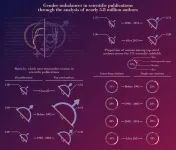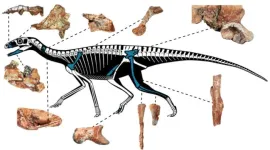(Press-News.org) People who speak two languages may be better at shifting their attention from one thing to another compared to those who speak one, according to a study published this month in the journal Bilingualism: Language and Cognition.
The study examined differences between bilingual and monolingual individuals when it comes to attentional control and ignoring information that isn’t important at the time, said its authors Grace deMeurisse, a University of Florida Ph.D. candidate studying linguistics, and Edith Kaan, a UF professor in the department of linguistics.
“Our results showed that bilinguals seem to be more efficient at ignoring information that's irrelevant, rather than suppressing — or inhibiting information,” deMeurisse said. “One explanation for this is that bilinguals are constantly switching between two languages and need to shift their attention away from the language not in use.”
For example, if an English- and Spanish-speaking person is having a conversation in Spanish, both languages are active, but English is put on hold but always ready to be deployed as needed.
Numerous studies have examined the distinctions between the two groups in broad cognitive mechanisms, which are mental processes that our brains use, like memory, attention, problem-solving, and decision-making, deMeurisse said.
“The effects of speaking two languages on a person’s cognitive control is often debated,” she said. “Some of the literature says these differences aren’t so pronounced, but that could be because of the tasks linguists use to research differences between bilinguals and monolinguals.”
DeMeurisse and Kaan set out to see if differences between the two groups would surface and used a task that has not been applied in psycholinguistics before called the Partial Repetition Cost task to measure the participants’ abilities to deal with incoming information and control their attention.
“We found that bilinguals seem to be better at ignoring information that's irrelevant,” Kaan said.
The two groups of subjects included functional monolinguals and bilinguals. Functional monolinguals were defined as those who had two years or less of a foreign language experience in a classroom and use only the first language that they learned as a child.
Bilinguals were categorized as people who had learned both their first and second language before the ages of 9 to 12 and were still using both languages.
Kaan explained that an individual’s cognitive traits continuously adapt to external factors, and as humans, we have very few traits that remain fixed throughout our lifetime.
“Our cognition is continuously adapting to the situation, so in this case it's adapting to being bilingual,” she said. “It doesn’t mean it won’t change, so if you stop using the second language, your cognition may change as well.”
The UF study demonstrates a need to build more consistencies among the varied experiments used to understand differences between those who speak one language and those who speak more than one.
“In the study of bilingualism and cognition, we are redefining the way we talk about differences between bilinguals and monolinguals and searching for more factors to consider and more methods to conduct that research,” deMeurisse said.
The researchers were also clear to point out that their study was not intended to show that people who speak two or more languages have an advantage over those who speak one.
“We are not looking for advantages or disadvantages,” deMeurisse said. “However, regardless of cognitive differences, learning a second language is always going to be something that can benefit you, whether those benefits are cognitive, social, or environmental. It will never be a negative to be exposed to a second language.”
END
The bilingual brain may be better at ignoring irrelevant information
New study examined differences between those who speak two languages and those who speak one
2023-11-21
ELSE PRESS RELEASES FROM THIS DATE:
Promising target for CAR T cells helps cancer trick the immune system
2023-11-21
(MEMPHIS, Tenn. – November 21, 2023) Findings from St. Jude Children’s Research Hospital are moving the field of cancer immunotherapy one step closer to treating brain and solid tumors. Scientists at St. Jude validated a cellular immunotherapy target called 78-kDa glucose-regulated protein (GRP78) in proof-of-principle experiments. The group also discovered a resistance mechanism whereby some tumors trick the cancer-killing immune cells into expressing GRP78, thereby turning off the immune cells or causing them to be killed, too. The research, which has implications for developing immunotherapy for the broad range of difficult-to-treat ...
Researchers help unravel brain processes involved in vision
2023-11-21
TORONTO, Nov. 21, 2023 – Faced with images that break the expected pattern, like a do not enter sign where a stop sign is expected, how does the brain react and learn compared to being shown images which match what was predicted?
That was the question a team, including York University, set out to answer. A long-standing theory suggests the brain learns a predictive model of the world and its internal predictions are updated when incoming sensory data proves them wrong. However, what the researchers found surprised them, says York Faculty of Science Associate Professor Joel Zylberberg, co-corresponding author of the newly published paper.
“Testing ...
Unearthing how a carnivorous fungus traps and digests worms
2023-11-21
A new analysis sheds light on the molecular processes involved when a carnivorous species of fungus known as Arthrobotrys oligospora senses, traps and consumes a worm. Hung-Che Lin of Academia Sinica in Taipei, Taiwan, and colleagues present these findings November 21st in the open access journal PLOS Biology.
A. oligospora usually derives its nutrients from decaying organic matter, but starvation and the presence of nearby worms can prompt it to form traps to capture and consume worms. A. oligospora is just one of many species of fungi that can trap and eat very small animals. Prior research has illuminated some of the biology behind this ...
Taxing sugar-sweetened beverages in Germany would improve population health and save money
2023-11-21
In Germany, taxing sugar-sweetened beverages could prevent or postpone cases of type 2 diabetes, extend healthy lifespans and save up to €16.0 billion in societal costs over the next 20 years, according to a new study led by Karl Emmert-Fees of the Technical University of Munich, published November 21st in the open access journal PLOS Medicine.
The World Health Organization has recommended that governments worldwide lessen the social and economic burden of cardiometabolic disease by taxing sugar-sweetened beverages. These taxes either reduce consumption by increasing the price, such as the one peso per liter ...
Germany: Sugar tax could save as much as 16 billion euros
2023-11-21
A simulation study conducted by a team from the Technical University of Munich (TUM) demonstrates that a soft drink tax in Germany would have significant positive effects. In all of the simulated variants evaluated, less sugar was consumed and the rate of illness dropped. This would be a way to reduce costs to the national economy and alleviate the burden on the health care system. There is, however, a difference between taxes aimed at reducing soft drink consumption and taxes aimed at bringing about changes in product formulation.
Sugary beverages increase the risk of obesity and illnesses such as diabetes. Several countries have therefore introduced taxes on soft drinks. In Germany ...
Most-cited scientists: still mostly men, but the gender gap is closing
2023-11-21
An analysis of 5.8 million authors across all scientific disciplines shows that the gender gap is closing, but there is still a long distance to go. The new research by John Ioannidis of the Meta-Research Innovation Center at Stanford (METRICs) at Stanford University, US, and colleagues, publishes November 21st in the open access journal PLOS Biology.
There is a strong gender gap in science which manifests itself in many ways. One of the most prominent ones is the relative representation of men and women among the scientists whose work receive the most attention in the ...
New fossil assemblage highlights complexity of classifying silesaurid phylogeny
2023-11-21
A set of fossils recovered in Rio Grande do Sul, Brazil’s southernmost state, has brought an extra layer of complexity to the study of the evolutionary history of silesaurids, a family of dinosauriforms (dinosaurs and their close relatives) that lived in the Triassic period between 247 million and 208 million years ago.
In an article published in the Journal of Vertebrate Paleontology, researchers affiliated with institutions in Brazil and the United States show that even with the new fossil assemblage ...
CRF launches Scientific Excellence Top 10 (SET-10)
2023-11-21
NEW YORK – November 20, 2023 – The Cardiovascular Research Foundation (CRF), in conjunction with the Transcatheter Cardiovascular Therapeutics (TCT) 2023 conference, CRF's annual scientific symposium, announced today the launch of the CRF Scientific Excellence Top 10 (SET-10), a new global annual ranking recognizing academic contributions to interventional cardiovascular medicine.
The SET-10 initiative, aligning with CRF's commitment to advancing the field, aims to recognize and celebrate the extraordinary contributions made by medical and academic ...
Cleveland Clinic research finds sex differences in immune response and metabolism drive Alzheimer’s disease
2023-11-21
Tuesday, Nov. 21, 2023, CLEVELAND: Cleveland Clinic researchers analyzed genes and brain tissue of patients with Alzheimer’s and found that differences in brain immunometabolism – the interactions between the immune system and the ways cells create energy – may contribute to women’s increased risk for the disease and its severity.
The findings, published in Alzheimer’s and Dementia, offer important insight into developing sex-specific treatment and prevention options for Alzheimer’s disease, the sixth-leading ...
Hearing loss is associated with subtle changes in the brain
2023-11-21
Hearing loss affects more than 60 percent of adults aged 70 and older in the United States and is known to be related to an increased risk of dementia. The reason for this association is not fully understood.
To better understand the connection, a team of University of California San Diego and Kaiser Permanente Washington Health Research Institute researchers employed hearing tests and magnetic resonance imaging (MRI) to determine whether hearing impairment is associated with differences in specific brain regions.
In the November 21, 2023 issue of the Journal of Alzheimer’s Disease, researchers reported that individuals enrolled in this observational ...
LAST 30 PRESS RELEASES:
Scientists discover why we know when to stop scratching an itch
A hidden reason inner ear cells die – and what it means for preventing hearing loss
Researchers discover how tuberculosis bacteria use a “stealth” mechanism to evade the immune system
New microscopy technique lets scientists see cells in unprecedented detail and color
Sometimes less is more: Scientists rethink how to pack medicine into tiny delivery capsules
Scientists build low-cost microscope to study living cells in zero gravity
The Biophysical Journal names Denis V. Titov the 2025 Paper of the Year-Early Career Investigator awardee
Scientists show how your body senses cold—and why menthol feels cool
Scientists deliver new molecule for getting DNA into cells
Study reveals insights about brain regions linked to OCD, informing potential treatments
Does ocean saltiness influence El Niño?
2026 Young Investigators: ONR celebrates new talent tackling warfighter challenges
Genetics help explain who gets the ‘telltale tingle’ from music, art and literature
Many Americans misunderstand medical aid in dying laws
Researchers publish landmark infectious disease study in ‘Science’
New NSF award supports innovative role-playing game approach to strengthening research security in academia
Kumar named to ACMA Emerging Leaders Program for 2026
AI language models could transform aquatic environmental risk assessment
New isotope tools reveal hidden pathways reshaping the global nitrogen cycle
Study reveals how antibiotic structure controls removal from water using biochar
Why chronic pain lasts longer in women: Immune cells offer clues
Toxic exposure creates epigenetic disease risk over 20 generations
More time spent on social media linked to steroid use intentions among boys and men
New study suggests a “kick it while it’s down” approach to cancer treatment could improve cure rates
Milken Institute, Ann Theodore Foundation launch new grant to support clinical trial for potential sarcoidosis treatment
New strategies boost effectiveness of CAR-NK therapy against cancer
Study: Adolescent cannabis use linked to doubling risk of psychotic and bipolar disorders
Invisible harms: drug-related deaths spike after hurricanes and tropical storms
Adolescent cannabis use and risk of psychotic, bipolar, depressive, and anxiety disorders
Anxiety, depression, and care barriers in adults with intellectual and developmental disabilities
[Press-News.org] The bilingual brain may be better at ignoring irrelevant informationNew study examined differences between those who speak two languages and those who speak one






